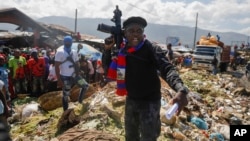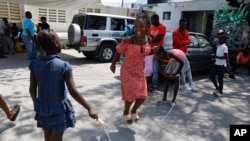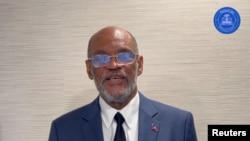Kenya volunteered to lead a security mission, largely funded by the United States and Canada, to violence-ravaged Haiti but said the initiative was on hold after Prime Minister Ariel Henry resigned on Monday in a deal pushed by Caribbean leaders and Washington.
Confirming an account by Ruto, Blinken said he spoke to the Kenyan leader by telephone and discussed a transitional council that was formed to name a new prime minister ahead of elections.
Ruto "confirmed Kenya’s preparedness to lead that mission just as soon as this new council is stood up—which we believe will happen in the next couple of days— and an interim president is elected," Blinken said.
The U.S secretary acknowledged the challenges ahead for Haiti, where public order has broken down and armed gangs control most of the capital.
Amid talks for the Kenya led mission and Haiti working towards finding an interim leader, gang leaders in the Caribbean nation on Wednesday pledged to continue fighting and plunging the nation into chaos.
Despite success in the mission to have Henry step down from his post, Jimmy Cherizier, a powerful Haitian gang leader known as "Barbecue," said his coalition of armed groups "do not care about Ariel Henry's resignation."
"We are going to continue the fight for Haiti's liberation," the former policeman under U.N. sanctions told Spanish-language network W Radio.
Haiti has not had a national election since 2016, and there is currently no president or parliament. President Jovenel Moise, who was assassinated in 2021, was not replaced, with Henry leading the country after his death.
Henry has been stranded in Puerto Rico after a visit to Kenya, where he hoped to nail down details of a plan for Nairobi to lead a U.N.-approved police force to restore order in Haiti.
In Haiti’s capital, Port-au-Prince, shops were open on Wednesday and life was slowly returning to normal. Buses were running and some government offices were open after a two-week closure. But schools stayed shut, as did the city's airport.
Several countries and the European Union have evacuated their diplomatic personnel due to the instability.
The U.N. mission in Haiti said it would be launching an "airbridge" from neighboring Dominican Republic to facilitate the movement of aid into the country.
Several residents welcomed the resignation of Henry but wondered how the powerful gangs —who control vast swaths of the country and 80 percent of the capital —will behave as Haiti tries to get back on its feet.
A man named Emmanuel, who declined to give his last name, said Henry "was the biggest obstacle we had."
"He did not really have a plan for what to do with the country. We need a fast mechanism to replace him," he said.
Another Haitian, named Jean Dieuchel, said "it is now up to the people to decide who should be prime minister and who should be president. These people should be Haitian patriots and they should have a sense of national sovereignty."
Haiti's transitional body is to have seven voting members drawn from political parties, the private sector and the Montana Group, a civil society coalition that had proposed an interim government in 2021 after Moise's assassination.
There will also be two non-voting seats on the council, one for civil society and another for the church. The body is supposed to quickly name an interim prime minister.
Parties close to Moise have selected their delegate to the transitional body but politicians loyal to Henry are still in disagreement over who will represent them.
Ivan Briscoe, the head of the International Crisis Group's Latin America and Caribbean program said, "we're talking about political parties, which have not been able to see eye to eye over the last few years," adding that now that Henry is heading out, "possibly they will look to the national interest and leave aside their party interests for a while until the elections."
Some information for this article was sourced from Agence France-Presse.









Forum